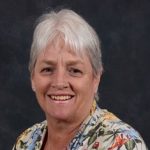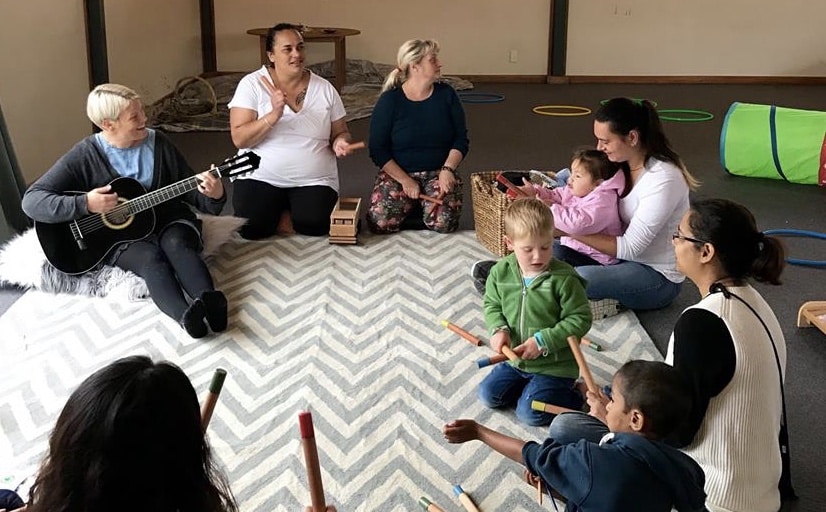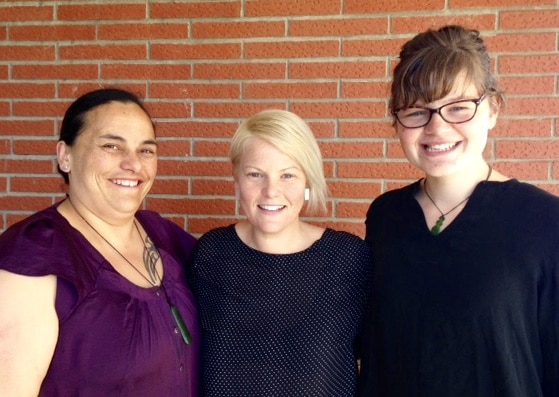
Mary Anne Gill
22 December 2017 – Spectrum Playgroup in Lower Hutt provides an environment of care and support for children on the autism spectrum and their families. So what makes the playgroup, funded from Givealittle donations and aided by professionals that can see the benefits, work so well?
Mary Anne Gill talks to its founder.

Big group times, such as music time are encouraged but children are not forced to participate in activities they do not want to join.
CAT NOAKES-DUNCAN has an infectious enthusiasm about something which would test most other parents.
Yes she has three children, two of them on the autism spectrum, and yes the early childhood teacher is training to be a specialist in teaching children on the spectrum; but that did not stop her from founding a community playgroup that seems to be making a difference in Lower Hutt.
“When parents get that diagnosis, they want somewhere to go straight away. They want someone to have eyes on their child and provide hands on help. What actually happens is they go on a waiting list and they wait.
“What I know as a parent and an early childhood teacher, is that early intervention is important,” she says.
Cat, husband Thomas, a lecturer in restorative justice at Victoria University, their two sons and daughter live in Naenae, Lower Hutt. In October 2016, after her second son’s diagnosis, Cat felt an overwhelming need to do something. Waiting for specialists was not an option.
“The thing with community playgroups is they are such an easy model so I thought ‘why don’t I start a community playgroup for kids on the spectrum’?”
She talked with her friend Brynlea Stone, a speech language therapist with an interest in community living who worked at Kimi Ora School.
“She thought it was a great idea and was willing to volunteer her time as our resident speech language therapist.”
Then came a meeting with Klara Hibbert and Heather Drysdale from the Hutt Valley DHB’s Child Development service who also gave the idea the thumbs up.

Louise, Cat and Brynlea are the key volunteers who run the playgroup.
Louise Ryan-Stickle, an amazing resource person within the wider community, came on board and they took to social media, founded a Givealittle page, secured a venue in Seddon Street and opened the doors.
It has been non-stop ever since. Cat, Louise and Brynlea form the key group who manage the playgroup as volunteers.
“We don’t claim to be specialists. We are a bunch of families who get together with their children,” says Cat.
“We provide families with support, we let them know they are not alone.
“Traditional community playgroups are great places but for someone with a disability or who is different, they can be painful places. If you have a child developing differently or behaving differently, that’s a really painful experience.
“For parents, they can come to playgroup and relax, they know their child is in an environment where they are not different, where everything – no matter what it is – is normal.”
For many of the children, it is their first experience of relating with other children in a tolerant environment of care and support.
“We bend over backwards for our parents to let their kids be kids and we totally celebrate the small things.”
Cat talks about the child who had no verbal language but then started screaming.
“It’s all about communication and we celebrated that. We think that’s amazing because she’s using vocal ranges, she’s squealing really high, she’s squealing really low and it’s all communication. We’re all about it. We just love those moments. That mum is so proud and we’re so proud with her.
“All of the parents are super understanding of where each child is at and what each child needs.
“One mother recently told us about not being able to take her child to a regular playgroup but finally being able to relax at Spectrum as her child is not under pressure to perform in any way or obey any rules.
“Our culture is fluid and adaptable,” says Cat.
“Another mother talked about how her son sits in the car for half an hour before finally deciding to go to kindy. He runs through the gates at Spectrum.
“Our parents are able to talk together and share knowledge, ideas and experiences of specific interventions and therapies.”
Cat and Louise ran a workshop at the Altogether Autism conference in July. The feedback was encouraging, says Cat.
“We discussed the challenges so many of our families face.
“For example one of our Maori mothers has had her child on the waiting list for assessment for over two years and her child is about to turn five and go to school.
“Many Maori parents worry they may be seen as pushy if they keep asking questions.”
Some parents with newly-diagnosed children on the autism spectrum are looking for a cure while others take the view they just want their child to be happy and thrive.
“Almost without exception, there are huge fears about sending their children to school.”
Brynlea gets alongside children and their families to support the child’s communication and social interactions. She is moving to Christchurch soon and Cat is optimistic the Ministry of Education will be able to replace her with another speech language therapist.
“The playgroup model will be more sustainable if we have buy-in from the likes of Ministry of Education and district health board professionals.
“Voluntary models are always more fragile and long-term sustainability remains an ongoing challenge,” says Cat.
Heather is the developmental services coordinator and Klara a massage therapist and therapy assistant for Hutt Valley DHB’s Child Development service.
“That provides families with support and shows they are not alone. That positive relationship we have with the DHB has positive spinoffs for our families,” says Cat.
Funding is an ongoing challenge. The playgroup recently successfully applied for funding to run a gross-motor development programme within its weekly playgroup session.
“With this funding we will purchase outdoor play equipment, gym mats and climbing frames. We will create a programme to help our children develop gross motor skills and a love of outdoor play.”
The course Cat is doing is the Massey University Postgraduate diploma in specialist teaching. The Ministry of Education provides funding for those teachers wanting to specialise in working with children on the autism spectrum.
“It’s an amazing course but I just wish more people would do it. There is just not enough uptake in the community.”
The part time long-distance course is over two years or another year if a teacher decides to do a Masters.
The Ministry funding provides tuition fees, travel contribution and study leave.
Cat is paying her own way because she did not qualify as she was not actually working as an early childhood teacher when she applied. Neither does the teacher aide taking the course with her. She just wants to add to her skillset and go back as a teacher aide with that specialist knowledge.
Cat recently appeared on Radio New Zealand’s Nine to Noon show where she pleaded for better training for teacher aides and for the scope of the study to be expanded to include former or part time teachers.
“There’s definitely a need out there. We’ve proven that at Spectrum Playgroup. We’re upskilling families so they know they have the skills to meet the needs of their children. We’re empowering them to take on their next steps, no matter how challenging.”
Check out the Spectrum Facebook page

Water Play with ice is a regular activity at Spectrum Playgroup, dinosaurs frozen in ice is a favourite.
This article first appeared in the Altogether Autism Journal Issue 1, 2018.


